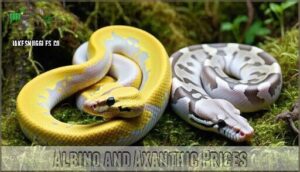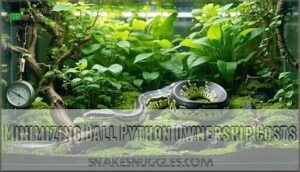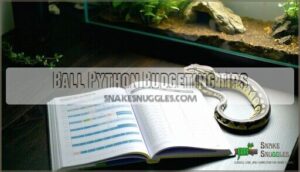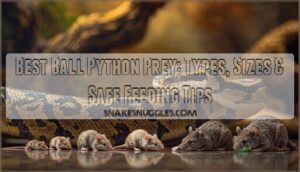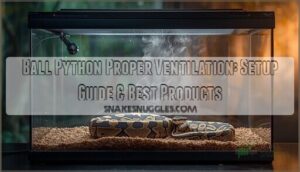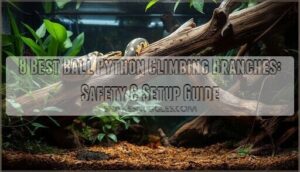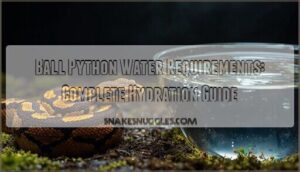This site is supported by our readers. We may earn a commission, at no cost to you, if you purchase through links.

Your upfront expenses include a terrarium ($100-300), heating equipment ($50-100), substrate ($20-40), and the snake itself ($50-500 depending on morph).
Monthly costs stay predictable – frozen mice run $5-15, substrate replacements cost $10-20, and electricity adds roughly $15.
Unlike cats or dogs that eat daily, your python only needs feeding once weekly, and veterinary visits are rare when you maintain proper temperatures and humidity.
Standard morphs keep costs reasonable, while designer genetics can stretch your budget considerably, but smart shopping and proper setup planning make ownership surprisingly affordable for most households, considering the overall cost of ownership.
Table Of Contents
- Key Takeaways
- Ball Python Ownership Costs
- Factors Affecting Ball Python Prices
- Ball Python Price Comparison
- Top 7 Ball Python Accessories
- Minimizing Ball Python Ownership Costs
- Ball Python Enclosure Costs
- Ongoing Ball Python Expenses
- Ball Python Budgeting Tips
- Frequently Asked Questions (FAQs)
- Why are ball pythons so expensive?
- How much does ball python ownership cost?
- How much does it cost to bring home a ball python?
- How much does a ball python cost in 2025?
- How much does a ball python enclosure cost?
- Do you earn a commission if you buy a ball python?
- How expensive is it to own a ball python?
- Are ball pythons high maintenance?
- How much does it cost to handle a ball python?
- What are the cons of owning a ball python?
- Conclusion
Key Takeaways
- You’ll need $300-800 upfront for your ball python setup, including the snake ($50-500), terrarium ($100-300), heating equipment ($50-100), and substrate, but ongoing costs stay predictable at just $30-60 monthly for food and maintenance.
- Your monthly expenses remain low since ball pythons only eat once weekly ($5-15 for frozen mice), need occasional substrate changes ($10-20), and rarely require vet visits when you maintain proper temperatures and humidity.
- You can significantly reduce costs by choosing standard morphs over designer genetics, adopting from rescues instead of buying from breeders, and building DIY enclosures that cut setup expenses in half.
- With a 20-30 year lifespan, you’ll spend $4,000-12,000 total on ownership, making ball pythons surprisingly economical compared to daily-feeding pets like cats or dogs that require frequent veterinary care.
Ball Python Ownership Costs
You’ll need to budget between $300-$800 for initial setup costs, which include your enclosure, heating equipment, substrate, and essential accessories.
Setting up your ball python properly requires a solid financial foundation—expect to invest $300-$800 upfront for essential equipment.
Beyond the upfront investment, expect ongoing monthly expenses of $15-$35 for food, substrate replacement, and regular maintenance to keep your ball python healthy throughout its 20-30 year lifespan.
Initial Setup Costs
Your initial ball python setup cost will range from $300-$500.
Enclosure size requirements vary by age, with adults needing 40+ gallon tanks ($75-$300).
Heating options include heat mats and ceramic emitters ($30-$80).
Substrate choice affects comfort and cost ($15-$40), and decor essentials like hides are essential ($20-$60).
Consider used equipment to reduce expenses substantially, and look for ways to save on initial costs.
Ongoing Expenses
After your initial setup investment, you’ll face regular ongoing expenses that keep your ball python healthy and comfortable.
Monthly costs add up quickly, so budgeting helps avoid surprises.
Your main recurring expenses include:
- Food costs: $10-15 monthly for frozen rodents and ball python food cost varies by size
- Substrate replacement: $5-10 monthly for fresh bedding materials
- Power consumption: $15-25 monthly for heating and lighting systems
- Vet checkups: $50-100 annually for preventive ball python health care
- Enrichment costs: $20-40 quarterly for new hides and environmental upgrades
Health Considerations
Ball python health issues can hit your wallet hard if you’re not prepared.
Your wallet isn’t prepared for a $500+ emergency vet bill at 2 AM.
Respiratory infections typically cost $100-200 to treat, while parasite treatment runs $50-150. Scale rot treatment averages $75-125.
Genetic disorders in certain morphs may require ongoing care. Preventative care through regular vet checkups helps catch problems early.
Snake insurance isn’t common, so budget for unexpected medical costs to ensure you can provide the necessary treatment, including parasite treatment.
Factors Affecting Ball Python Prices
When you’re shopping for a ball python, you’ll quickly discover that prices can vary dramatically from $25 for a normal morph to over $10,000 for rare genetic combinations.
Several key factors determine these price differences, including the snake’s genetics and morph patterns, its age and size, specific color variations, and whether it’s captive-bred or imported.
Genetics and Morphs
Understanding snake genetics directly impacts your wallet when shopping for ball python morphs.
Dominant traits like spider or pinstripe cost less than recessive genes requiring two copies to express.
Designer morphs combining multiple traits command premium prices, while polygenic morphs show variable expression affecting value.
Morph rarity drives costs higher—simple recessive genes cost $200-500, but complex morph inheritance patterns can reach thousands.
Size and Age
A ball python’s age and size directly impact its price tag.
Hatchling price typically starts at $50-100, while adult cost jumps to $400-1000 for breeding adults.
Size impact is significant – larger snakes command higher prices due to their proven growth rate and reproductive potential.
Adult females especially cost more since their ball python size indicates successful maturity and breeding capability.
Color and Pattern
Beyond genetics alone, visual appeal drives ball python price substantially.
Striking orange and yellow hues command premium costs due to their eye-catching nature.
Pattern complexity affects morph rarity – intricate designs like killer clown morphs reach $2,100 while simpler patterns stay under $200.
Color genetics determine designer morphs’ value, with vibrant combinations attracting collectors willing to pay top dollar for exceptional snake color variations.
Captive-Bred Vs Imported
You’ll notice captive-bred ball pythons cost more than imported ones, but there’s good reason.
Captive breeds offer significant advantages that justify higher snake price factors when you’re shopping for a ball python for sale.
Consider these compelling benefits of choosing captive-bred over imported breeds:
- Health advantages – Known medical history and parasite-free guarantee
- Genetic diversity – Traceable lineage guarantees quality breeding outcomes
- Ethical sourcing – Supports responsible breeding practices over wild collection
- Acclimation success – Already adapted to captive conditions and feeding
- Conservation impact – Reduces pressure on wild populations
Ball Python Price Comparison
You’ll find ball python prices vary dramatically based on their morph, with normal varieties starting around $25-60.
While rare genetic combinations can reach $10,000 or more, understanding these price differences helps you budget appropriately.
This understanding allows you to choose a snake that fits both your preferences and financial situation.
Normal Morph Prices
Normal morphs represent the most budget-friendly entry point into ball python ownership.
These wild-type pricing options typically range from $25 to $200, making them perfect beginner snakes.
Availability factors keep costs low since common morphs are widely bred.
When seeking a ball python for sale, ethical sourcing from reputable breeders guarantees healthy animals within this affordable price range.
Genetics impact pricing, with recessive genes and unique mutations driving up costs.
| Morph Type | Price Range | Availability |
|---|---|---|
| Wild-Type | $25-$60 | Very High |
| Normal/Standard | $50-$100 | High |
| Common Variations | $75-$200 | Moderate |
Rare Morph Prices
Collectors know that rare morphs represent serious morph investment opportunities, with prices reflecting breeding challenges and demand factors.
The most coveted snake morphs can reach astronomical values due to morph rarity and price volatility in the market.
| Morph Type | Price Range |
|---|---|
| Green Tree Python (Blue) | $445,800 |
| Sunset Ball Python | $70,000 |
| Lavender Albino | $40,000 |
| Paradox Ball Python | $30,000 |
These rare morphs command premium prices, though ethical concerns about extreme breeding practices continue shaping snake morph prices across the industry.
Albino and Axanthic Prices
Albino and axanthic ball pythons represent premium investment opportunities in the morph market.
Albino genetics produce striking yellow and white patterns, while axanthic variations showcase stunning grayscale tones.
Price determinants include lineage quality and morph combinations potential.
| Morph Type | Price Range | Investment Potential |
|---|---|---|
| Albino Ball Python | $200-$700 | High appreciation |
| Axanthic Ball Python | $300-$950 | Stable growth |
| Combo Morphs | $500-$1,500 | Premium returns |
The morph types, including Albino Ball Python, Axanthic Ball Python, and Combo Morphs, have distinct investment potential.
Top 7 Ball Python Accessories
You’ll need specific accessories to create a proper ball python habitat that maintains correct temperature, humidity, and environmental conditions.
These seven essential accessories represent the most important items for successful ball python care, ranging from lighting systems to substrate materials that directly impact your snake’s health and comfort, and are crucial for successful ball python care.
1. ReptiSun 5.0 UVB Fluorescent Reptile Bulb
View On Amazon
Every responsible ball python owner needs proper UVB lighting, and the ReptiSun 5.0 delivers exactly what your snake requires.
This 25-watt T8 fluorescent bulb provides essential UVB output up to 12 inches, helping prevent metabolic bone disease while boosting your python’s appetite and activity levels.
You’ll notice increased alertness compared to cheaper alternatives, and for optimal performance, it’s recommended to replace it every 12 months and position it 6-8 inches from your snake’s basking spot.
At around $17, it’s a worthwhile investment in your pet’s long-term health, considering the benefits of proper lighting for preventing diseases like metabolic bone disease, and the overall improvement in your python’s appetite and well-being.
Best For: Reptile owners looking for a reliable UVB bulb to support their pet’s health and prevent diseases like metabolic bone disease.
- Needs replacement every 12 months for optimal effectiveness.
- Strong initial UVB output may require a brief adjustment period for reptiles.
- Limited to T8 fluorescent fixtures for compatibility.
- Provides strong UVB output up to 12 inches for effective vitamin D3 synthesis.
- Boosts appetite, activity, and overall health in reptiles.
- Affordable price for long-lasting performance.
2. Exo Terra Repti-Glo Terrarium Lamp
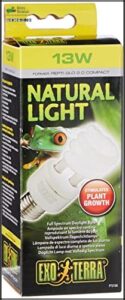
The Exo Terra Repti-Glo Terrarium Lamp delivers reliable full-spectrum lighting for your ball python’s habitat.
This 13-watt bulb produces bright 6700K daylight with minimal heat output, raising tank temperatures less than 2 degrees.
You’ll appreciate its sturdy glass construction and long-lasting performance.
The lamp enhances your snake’s natural colors while providing essential UVA radiation to stimulate appetite and activity.
Though some users find it dimmer than discontinued alternatives, it’s an excellent complement to UVB bulbs for thorough terrarium lighting needs.
Best For: Owners of reptiles, amphibians, and planted terrariums looking for a full-spectrum, low-heat, daylight bulb to enhance habitat lighting.
- Dimmer than discontinued alternatives, making it less ideal for brighter setups.
- Limited heat output, unsuitable for temperature-increasing needs.
- Mixed feedback on supporting plant growth in terrariums.
- Provides bright 6700K daylight with 98 CRI for true color enhancement.
- Emits UVA radiation to stimulate appetite, activity, and reproductive behavior.
- Long-lasting, sturdy design that survives shipping and frequent use.
3. ReptiChip Coconut Reptile Bedding Substrate
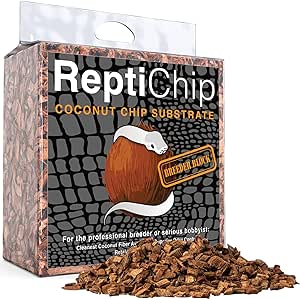
Quality substrate makes all the difference in your ball python’s comfort and health.
ReptiChip Coconut Reptile Bedding offers excellent humidity retention from 100% organic coconut husk that’s triple-washed for cleanliness.
You’ll get 2.5 cubic feet of bedding from one compressed brick when you add water.
It’s dust-free and perfect for maintaining stable humidity levels your python needs.
A good substrate also supports burrowing behaviors in ball pythons.
The substrate absorbs odors effectively and works well for burrowing species.
Expect to pay around $15-25 per brick, making it cost-effective for long-term use, and providing a suitable environment for your ball python’s overall well-being.
Best For: Reptile owners looking for an organic, easy-to-use substrate with excellent humidity retention and odor control.
- Made from 100% organic, triple-washed coconut husk for cleanliness.
- Retains moisture efficiently to maintain stable humidity levels.
- Dust-free and odor-absorbing, providing a clean and fresh environment.
- Slightly more expensive than other options on the market.
- Some sharp pieces may require careful handling.
- Requires a storage container for expanded substrate.
4. Zoo Med Aspen Snake Bedding
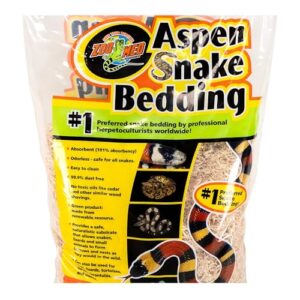
Zoo Med’s Aspen Snake Bedding stands as the gold standard among professional herpetoculturists worldwide.
This dust-free substrate offers 191% absorbency while remaining completely odorless and non-toxic.
You’ll appreciate its natural properties that allow your ball python to burrow and nest instinctively.
The 8-quart bag costs around $15-20, making it budget-friendly for regular substrate changes.
Unlike cedar alternatives, aspen contains no harmful oils that could irritate your snake’s respiratory system, ensuring your pet’s long-term health and comfort.
Best For: Snake owners, reptile enthusiasts, or pet keepers looking for a clean, safe, and natural substrate for their pets.
- Dust-free and hypoallergenic, ensuring a healthy environment for pets.
- High absorbency rate (191%) and easy to clean, reducing maintenance effort.
- Odorless, non-toxic, and free of harmful oils like those found in cedar.
- May require a moisture-handling substrate for certain reptiles.
- Light packaging compression requires loosening before use.
- Smaller bag sizes can be less cost-effective for larger terrariums.
5. Galápagos Terrarium Green Sphagnum Moss
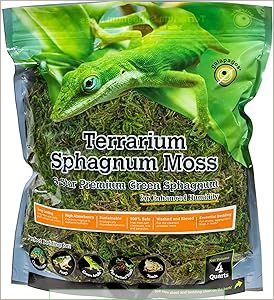
Moss isn’t just decoration—it’s a humidity powerhouse for your ball python’s enclosure.
Galápagos Terrarium Green Sphagnum Moss creates the perfect microclimate for healthy shedding while fighting mites and odors naturally.
This long-fiber moss holds moisture without turning into a soggy mess, making it ideal for humid hides.
You’ll pay around $8-12 for a 4-quart bag that spreads easily and maintains its vibrant green color.
It’s sustainably sourced and won’t harm your snake if accidentally ingested during feeding.
Best For: Ball python owners and other reptile or amphibian enthusiasts needing a humidity-retentive, natural bedding solution.
- Holds moisture well without becoming soggy.
- Naturally fungicidal to combat mites and odors.
- Sustainable, non-toxic, and safe if accidentally ingested.
- May require multiple bags for larger enclosures.
- Needs regular maintenance to prevent mold.
- Some users report it doesn’t maintain humidity as expected in certain setups.
6. Fluker’s Pothos Repta Vines for Terrariums
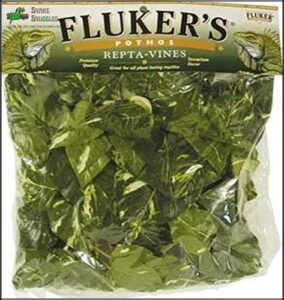
Natural beauty transforms your ball python’s habitat with Fluker’s Pothos Repta Vines.
These six-foot artificial vines cost around $8-12 and create realistic jungle environments your snake will love exploring.
Made from non-toxic polyethylene, they’re safe and easy to clean when accidents happen.
The included suction cups stick firmly to glass tanks, while the bendable design lets you shape perfect climbing paths.
You’ll appreciate how these durable vines maintain humidity levels and provide essential cover without the hassle of maintaining live plants, making them a great alternative to live plants.
Best For: Reptile and amphibian owners looking for a durable, low-maintenance alternative to live plants in their terrariums.
- Realistic design enhances terrarium aesthetics.
- Safe, non-toxic polyethylene material.
- Easy to shape and clean for flexible setups.
- Suction cups may not hold securely in all conditions.
- Colors may fade over time or vary between batches.
- Exposed wires after trimming may pose safety issues.
7. REPTI ZOO 67 Gallon Terrarium
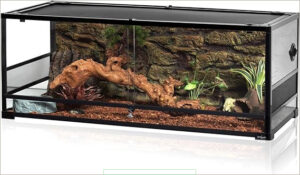
Every serious ball python owner needs a spacious, reliable home for their snake.
The REPTI ZOO 67 Gallon Terrarium delivers exactly that at $269.99, down from $324.99.
This 48"x18"x18" enclosure features tempered glass construction, sliding front doors with locks, and excellent ventilation through mesh panels.
You’ll appreciate the raised bottom frame that accommodates heating pads and the cable management port for clean wire routing.
Assembly takes just five minutes, and the collapsible design makes storage or transport effortless when needed.
Best For: Owners of snakes, adult bearded dragons, or other reptiles needing a spacious and secure habitat.
- Slightly smaller than advertised dimensions (46-47 inches instead of 48 inches).
- Not watertight above 4 inches, limiting water usage for semi-aquatic pets.
- Minor gaps in sliding doors may require weather stripping for smaller animals.
- Durable tempered glass with excellent ventilation for temperature and humidity control.
- Raised bottom and waterproof design suitable for desert or rainforest setups.
- Easy 5-minute assembly with clear instructions and collapsible storage.
Minimizing Ball Python Ownership Costs
You can substantially reduce your ball python ownership costs through strategic planning and smart purchasing decisions.
By choosing standard morphs, adopting from rescues, and setting up DIY habitats, you’ll cut expenses while still providing excellent care for your snake.
Research and Compare Prices
Before diving into ball python ownership, you’ll want to shop around like you’re hunting for the perfect deal. Compare ball python prices across morph marketplaces and check breeder reputations thoroughly.
Don’t forget seasonal sales can slash costs substantially. Consider long-term value over initial sticker shock—sometimes paying more upfront saves money on vet costs later through healthier genetics.
Initial setup costs, including tank and enclosure, should also be factored in to ensure you’re making an informed decision about your ball python ownership.
Rescue or Adopt
Adoption from rescue centers offers significant adoption savings compared to breeder prices, with ball python adoption fees typically ranging $25-$100.
Rescue organizations provide thorough health assessments and detailed snake temperament evaluations, giving you valuable insights into your future pet’s behavior.
Shelters often include basic supplies, and adoption benefits extend beyond cost savings to supporting reptile welfare.
Choose Standard Morphs
Standard morphs offer the best bang for your buck when entering ball python ownership.
Common genetics like normal, pastel, and spider morphs keep costs manageable while still providing beautiful snakes.
Here’s why standard morphs make financial sense:
- Low-Cost Morphs – Normal morphs range $25-$200 versus rare varieties exceeding $10,000
- Easy Availability – Beginner morphs are widely available from multiple breeders
- Morph Popularity – Standard varieties maintain consistent price ranges without extreme fluctuations
Buy Young Pythons
Younger ball pythons cost substantially less than adults, with hatchlings starting around $25-100 compared to adult females at $800-1000.
You’ll save on ball python initial costs while ensuring better early handling and juvenile temperament development.
Hatchlings adapt faster to your care routine, though growth rate means frequent feeding adjustments.
Monitor hatchling health closely during those vital first months of ball python ownership costs, considering the overall ball python ownership.
DIY Habitat Setup
Building your own snake enclosure cuts initial setup costs in half.
Budget DIY projects using plywood and glass panels cost $100-200 versus $400+ for commercial units.
Basic carpentry skills and proper ventilation design create safe, functional snake habitats.
Material sourcing from hardware stores keeps expenses low while ensuring your ball python’s comfort and security needs are met.
Ball Python Enclosure Costs
You’ll need to budget between $250 and $800 for your ball python’s complete enclosure setup, with costs varying based on tank size and equipment quality.
The enclosure itself represents your largest single expense, ranging from $70 for a basic 20-gallon tank to $450 for a premium 67-gallon system with professional features.
Terrarium and Enclosure Prices
Your ball python enclosure represents the biggest upfront investment in your snake setup cost.
Glass terrariums range from $90 for basic models to $400 for premium options. The T-Rex Double Door costs $230-$400, while Zilla’s front-opening terrarium runs $90.
Building DIY options starts around $150-175 for materials. Many owners look for ball python supplies online.
Used enclosures offer significant savings for budget-conscious owners, providing a more affordable option for those looking to minimize their initial investment in a ball python enclosure.
Dry Hide and Humid Hide Costs
Your ball python enclosure needs both dry and humid hides for proper thermoregulation and shedding.
Here’s what you’ll spend on these ball python accessories:
- Commercial dry hides – $10-30 depending on hide material and size
- Humid hide boxes – $15-25 with built-in humidity control features
- DIY hides – $5-15 using tupperware containers and moss
- Large adult hides – $25-40 because size matters for comfort
- Hide placement duplicates – $20-50 for both warm and cool sides
These hides are essential for reducing reptile stress.
Heating Apparatus and Thermometer Costs
Proper heating apparatus forms the backbone of your ball python’s health.
Heat mats ($20-40) provide belly heat, while ceramic emitters ($25-50) create ambient warmth.
Thermostat importance can’t be overstated—they prevent dangerous overheating.
Temperature gradients require accurate monitoring through reliable thermometers ($10-30).
Many owners also look for specific heat products for their enclosures.
Here’s your heating breakdown:
| Heating Equipment | Price Range | Purpose |
|---|---|---|
| Heat Mats | $20-$40 | Belly heat source |
| Ceramic Emitters | $25-$50 | Ambient temperature |
| Digital Thermometers | $10-$30 | Temperature monitoring |
Infrared costs vary, but heat mat safety always comes first, ensuring the proper heating apparatus and preventing overheating with the use of a thermostat.
Ongoing Ball Python Expenses
After you’ve set up your ball python’s habitat, you’ll face regular monthly expenses that continue throughout your snake’s 20-30 year lifespan.
These ongoing costs typically range from $15-35 per month and include feeding, substrate replacement, utility increases, and occasional veterinary care.
The expenses are part of owning a pet snake, with costs including substrate replacement, utility increases, and occasional veterinary care.
Food and Substrate Costs
Beyond housing setup, you’ll spend consistently on food requirements and ball python substrate throughout your snake’s lifetime.
Ball python feeding costs depend on several factors that directly impact your monthly budget.
Here’s what affects your ongoing expenses:
- Rodent Size – Adult pythons need larger prey ($8-15 per meal) compared to juveniles ($3-6 per meal)
- Frozen vs. Live – Frozen rodents cost 30-50% less and offer bulk buying advantages
- Substrate Types – Cypress mulch ($15-25) lasts longer than paper towels requiring frequent replacement
- Cleaning Frequency – Monthly substrate changes keep costs predictable at $10-20 per replacement
Veterinary Care and Medications
Regular snake veterinary care keeps your ball python healthy and catches problems early.
Initial wellness checks cost $40-60, while follow-up visits add $10-20.
Common ailments like parasites require fecal exams ($20-70) and medication costs around $25-40.
Emergency treatment can exceed $200.
Finding experienced reptile vets is essential since not all veterinarians handle snake health issues effectively.
Environment Maintenance and Upgrades
How much should you budget for ongoing habitat maintenance and upgrades? Your ball python setup cost extends beyond the initial purchase, requiring regular attention to keep your snake healthy and comfortable.
- Enclosure cleaning supplies and substrate replacement – $15-25 monthly for proper hygiene
- Humidity control equipment upgrades – $30-60 annually for ideal environmental conditions
- Temperature gradient monitoring and heating options improvements – $25-50 yearly for consistent thermal regulation
Ball Python Budgeting Tips
You’ll want to establish a realistic budget that accounts for both predictable monthly expenses and unexpected veterinary costs throughout your ball python’s 20-30 year lifespan.
Smart financial planning includes setting aside funds for emergencies, considering pet insurance options, and tracking your spending patterns to avoid costly surprises down the road, which is part of smart financial planning.
Monthly Cost Estimates
Your monthly costs typically range from $15-35, with feeding costs consuming the largest chunk at $8-15 per month.
Substrate replacement runs $3-8, while heating expenses add $2-5 to your electricity bill.
Don’t forget your enrichment budget of $2-7 for occasional decor updates.
These ongoing expenses remain predictable, but unexpected vet visits can disrupt your careful planning.
You may also want to explore pet insurance options for further financial security, and consider unexpected vet visits.
Emergency Fund and Pet Insurance
Instead of paying pet insurance premiums, consider building an emergency fund specifically for unexpected vet bills.
Most reptile veterinarians require full payment upfront for snake medical care, making emergency savings essential.
Compare snake insurance options against setting aside $20-30 monthly, as ball python vet costs for emergencies can reach $300-500, so having dedicated coverage options or emergency funds provides peace of mind.
Long-Term Budgeting and Planning
Ball pythons live 20-30 years, making long-term budgeting essential for responsible ownership.
You’ll face evolving expenses throughout your snake’s lifetime that require careful financial planning.
Consider these major long-term costs:
- Unexpected Vet Bills – Emergency treatments can exceed $500
- Long-Term Food Costs – Annual feeding expenses of $100-200
- Future Enclosure Upgrades – Larger habitats as your python grows
- Breeding Considerations – Equipment and veterinary costs if breeding
- Inheritance Planning – Care arrangements for your snake’s extended lifespan
Frequently Asked Questions (FAQs)
Why are ball pythons so expensive?
Like diamonds in the rough, ball pythons command high prices because you’re paying for unique genetics and rare morphs.
Captive breeding, specialized care requirements, and limited availability of designer color patterns drive costs up substantially.
How much does ball python ownership cost?
You’ll spend $300-500 initially for setup and snake, then $200-400 annually for food, bedding, and vet care. Over their 20-30 year lifespan, expect total ownership costs of $4,000-12,
How much does it cost to bring home a ball python?
Ready to welcome your new scaly friend? You’ll need $300-$800 upfront for the snake ($50-$500) plus essential setup like enclosure, heating, substrate, and hides. Budget wisely for this exciting investment.
How much does a ball python cost in 2025?
You’ll typically pay between $50-$500 for a ball python in Normal morphs start around $50, while rare varieties like GHI morphs can cost $2,900-$4, Your snake’s genetics determine the final price.
How much does a ball python enclosure cost?
Getting your setup right off the bat matters—you’ll spend $250-$800 for a complete ball python enclosure. Basic tanks cost $50-$300, while heating, substrate, hides, and accessories add $200-$500 more.
Do you earn a commission if you buy a ball python?
I don’t earn any commission from ball python purchases.
You’re dealing directly with breeders, pet stores, or reptile expos when buying your snake.
My role is providing information, not sales transactions.
How expensive is it to own a ball python?
Like a medieval knight’s armor, you’ll invest $300-800 initially for setup, then $200-400 annually for feeding and care.
Your ball python’s 20-30 year lifespan means budgeting around $4,000-12,000 total ownership costs.
Are ball pythons high maintenance?
No, ball pythons aren’t high maintenance pets.
You’ll spend just 10-15 minutes daily on basic care, feed them weekly, and handle minimal cleaning.
They’re actually one of the easiest snakes to keep.
How much does it cost to handle a ball python?
Handling a ball python doesn’t cost anything extra beyond your initial setup investment.
You’ll simply need clean hands and gentle confidence.
The snake itself requires no special handling equipment or fees.
What are the cons of owning a ball python?
You’ll face long-term commitment with 20-30 year lifespans, expensive veterinary bills, feeding live prey, maintaining precise temperatures, potential feeding strikes, and limited interaction since they’re not social pets.
Conclusion
Understanding ball python cost of ownership empowers you to make informed decisions about reptile companionship.
You’ll typically invest $300-800 initially, then maintain affordable monthly expenses of $30-60.
Standard morphs keep costs reasonable while designer genetics stretch budgets considerably.
Smart planning, price comparison, and proper setup research minimize expenses substantially.
With their low maintenance requirements, infrequent feeding schedules, and minimal veterinary needs, ball pythons offer surprisingly economical pet ownership compared to traditional mammals requiring daily care.
- https://www.reddit.com/r/ballpython/comments/rye8p6/is_it_expensive_to_own_a_ball_python/
- https://community.morphmarket.com/t/pricing-of-snakes/34658
- https://pangovet.com/pet-lifestyle/snakes/ball-python-cost/
- https://exoticdirect.co.uk/news/python-costs-how-much-does-it-cost-keep-royal-ball-python/
- https://www.quora.com/How-much-does-a-ball-python-cost-as-a-pet-in-the-USA




